LisbonLisboaPortugal.com
The best independent guide to Lisbon
LisbonLisboaPortugal.com
The best independent guide to Lisbon
Cacilhas, Lisbon: a tourism guide for 2026
Cacilhas is Lisbon's most authentic waterfront district, lying directly across the Tagus River from the capital. This working-class neighbourhood offers visitors a fascinating contrast to polished central Lisbon, combining maritime history, exceptional seafood restaurants, and stunning views of the city skyline.
The district sits just a 10-minute ferry ride from Cais do Sodré, making it an easy and rewarding half-day trip. Unlike Lisbon's tourist-heavy neighbourhoods, Cacilhas retains its genuine Portuguese character, where locals outnumber visitors and restaurants cater to discerning Lisboetas rather than tour groups.
Historically a fishing village and later home to the massive Lisnave shipyards, Cacilhas offers a unique perspective on Lisbon's maritime heritage. The ferry journey alone justifies the trip, providing some of the best views of Lisbon for just €1.55.
This guide will help you discover Cacilhas's maritime museums, find the best seafood restaurants, and navigate recent changes to the waterfront access.
Highlights of Cacilhas
Fragata D. Fernando II e Glória – Portugal's last sailing warship is now a magnificent museum ship. This beautifully restored 1843 frigate offers visitors the chance to explore four decks of naval history.
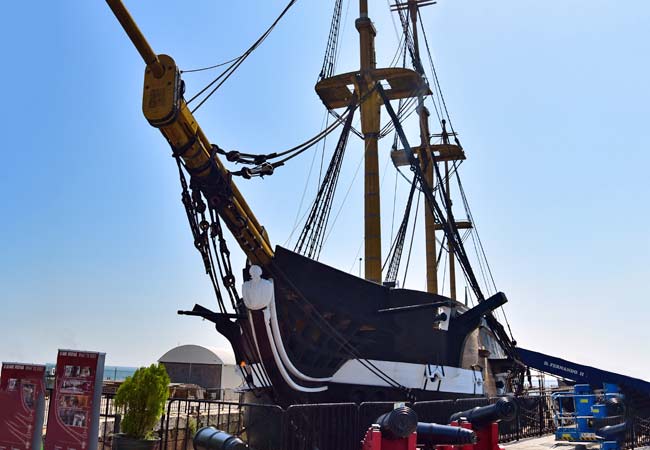
Ponto Final restaurant – Lisbon's most photographed restaurant sits on a narrow stone pier jutting into the Tagus, with yellow chairs placed so close to the water you can hear the waves beneath your table.
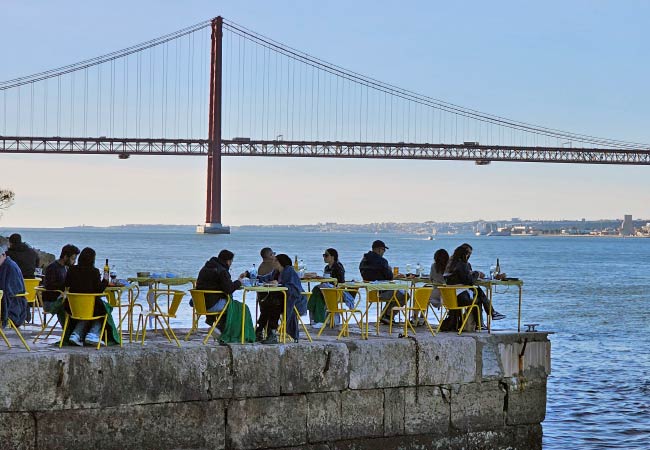
The submarine Barracuda – Step inside this Cold War-era submarine to experience the claustrophobic conditions endured by its 54-man crew during weeks beneath the Atlantic.
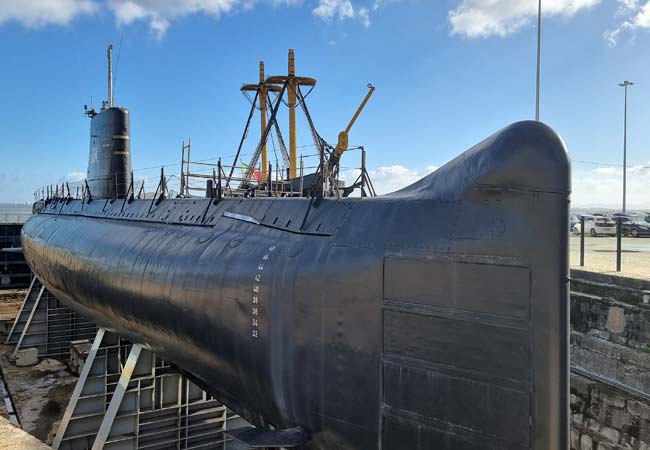
Fresh seafood at local prices – Cacilhas is where Lisboetas come for authentic seafood without tourist markups. From simple grilled sardines to elaborate seafood platters, the quality is exceptional.
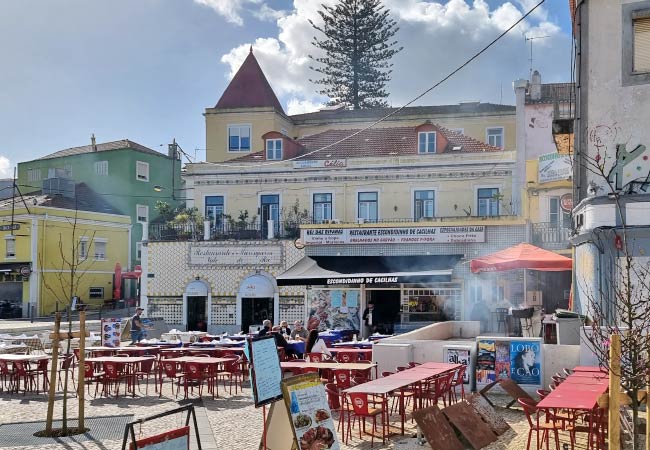
The panoramic ferry ride – The ferry crossing offers spectacular views of Lisbon's skyline, the 25 de Abril Bridge, and the Cristo Rei statue, making it one of Europe's best-value scenic journeys.
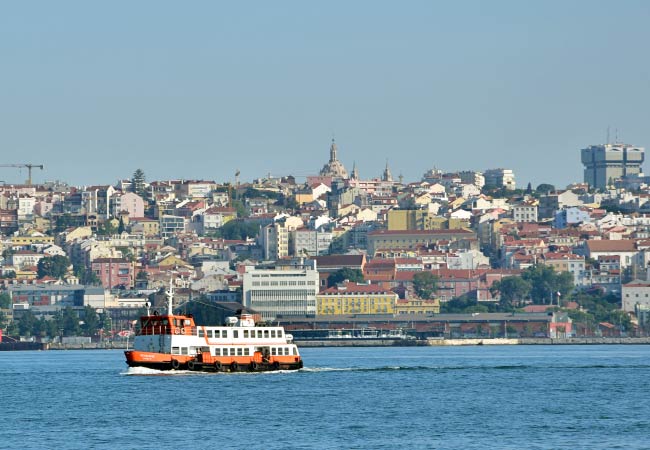
Important Update: Waterfront Path Closure
The main riverside walkway (Cais do Ginjal) between the ferry terminal and the Ponto Final is closed due to safety concerns about collapsing retaining walls. There is no route to walk along the river front to Ponto Final. There is a long retour but passes through bland residential streets.
To reach the waterfront restaurants, you must now take the official detour through upper Cacilhas:
• Walk up Rua Cândido dos Reis from the ferry terminal
• Follow signs to the Elevador da Boca do Vento (free panoramic lift)
• Take the 50-meter elevator down the cliff (great views)
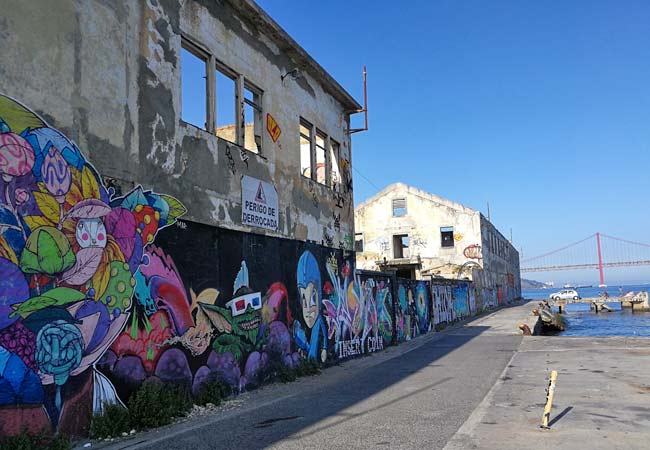
The old warehouses of the Cais do Ginjal are set for destruction, and the pathway is currently closed.
What to see in Cacilhas
The Maritime Trail
The maritime attractions sit within 100 meters of the ferry terminal, creating an easy museum circuit:
1. Fragata D. Fernando II e Glória
This remarkable sailing ship served the Portuguese Navy from 1843 to 1878, traveling over 100,000 nautical miles. After a devastating fire in 1963, she lay abandoned until a complete restoration for the 1998 Lisbon Expo. Today, visitors can explore the captain's quarters, gun decks, and crew areas. The ship is surprisingly large and well-preserved, offering an authentic glimpse of 19th-century naval life.
2. Submarino Barracuda
This French-designed submarine served during the Cold War from 1968 to 2010. Now in dry dock, visitors can squeeze through its narrow corridors and see how 54 crew members lived in these cramped conditions. Not suitable for claustrophobic visitors or those with mobility issues.
3. Farol de Cacilhas
This charming red and white lighthouse has a remarkable history. Built in 1886, it guided ships through Tagus fogs until 1983. After demolition, it was shipped to the Azores to replace an earthquake-damaged lighthouse. In 2009, following a local campaign, it returned to Cacilhas and now stands on a modern pier near its original location. While purely decorative today, it's a perfect photo spot.
4. Igreja de Nossa Senhora do Bom Sucesso
Built 1756-1759 as thanksgiving for the town's survival of the 1755 earthquake, this church contains magnificent 18th-century azulejo tiles depicting the life of the Virgin Mary. The blue and white tile panels are among the finest in the Lisbon region.
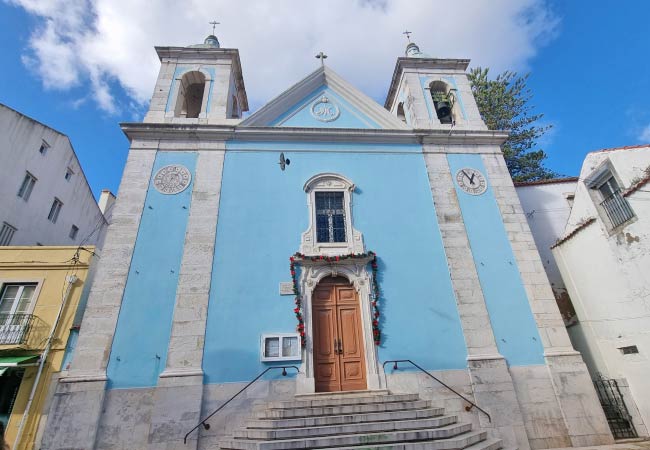
Cacilhas waterfront
Elevador da Boca do Vento
This modern (if somewhat utilitarian) elevator provides a dramatic shortcut between Cacilhas's cliff top and the waterfront below. Inaugurated in 2000, the glass-walled cabin descends 50 meters while offering spectacular views of the Tagus and Lisbon. The elevator runs during daylight hours and is completely free to use. At the top, you'll find a fantastic viewpoint, but the real reward lies at the bottom and the Jardim do Rio.
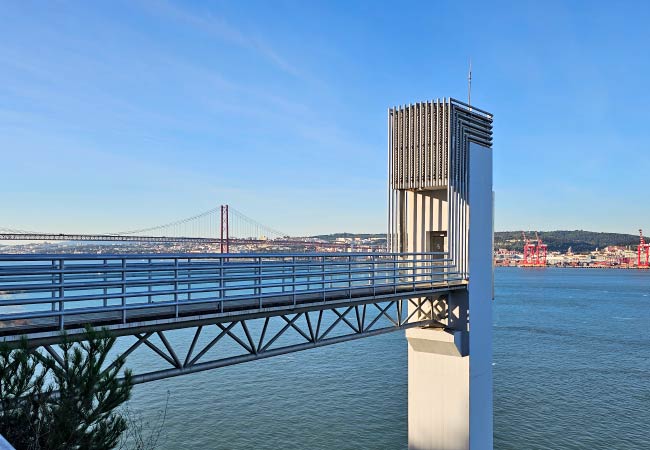
Jardim do Rio
Stepping off the elevator, you'll discover this pleasant riverside park tucked along the waterfront. Once easily accessible via the Cais do Ginjal walkway (now closed), Jardim do Rio has become something of a hidden gem that few visitors stumble upon. This relative seclusion is part of its charm, especially on warm summer evenings when it transforms into one of Lisbon's finest sunset-watching spots. The park makes an ideal stop before or after dining at the nearby Ponto Final restaurant.
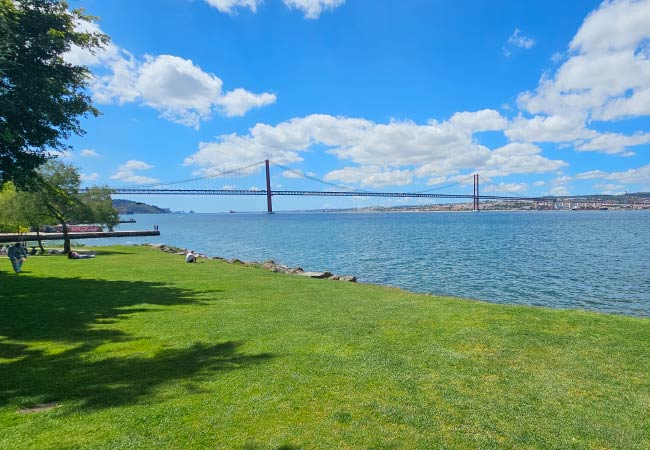
People gathering to watch the sunset on the Jardim do Rio
Cristo Rei
The towering Cristo Rei statue, while technically in Almada, is easily reached from Cacilhas and makes a logical addition to your visit. This 110-meter monument was inspired by Rio's Christ the Redeemer and offers spectacular 360-degree views from its base, including what many consider the finest viewpoint of Lisbon's 25 de Abril suspension Bridge. From the viewing platform, the rust-red suspension bridge stretches majestically across the Tagus below, its Art Deco towers framing the Lisbon skyline beyond.
To travel to Cristo Rei from Cacilhas take the 3001 bus from bus station (next to ferry terminal). The journey takes 10-20 minutes and costs €1.50. The sanctuary grounds are free, but the elevator to the viewing platform costs €8.
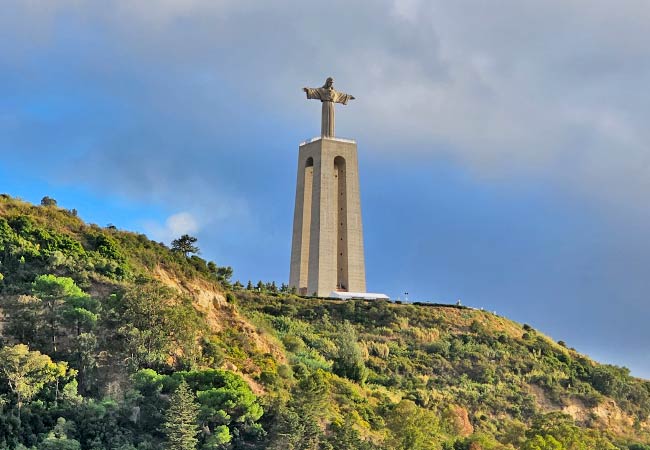
The interactive map below shows the sights and restaurants of Cacilhas (note: zoom out to see all of the points)
Sights: 1) Ferry terminal 2) Cacilhas lighthouse 3) Fragata D. Fernando II e Glória 4) Barracuda submarine 5) Nossa Senhora do Bom Sucesso church 6) Elevador da Boca do Vento 7) Jardim do Rio 8) Cristo Rei 9) Ponte 25 de Abril
Restaurants: 10) Ponto Final 11) Atira-te ao Rio 12) Restaurante Farol 13) Solar Beirão 14) Cabrinha 15) Cova Funda 16) Vale do Rio
Travel to Cacilhas
The Transtejo ferry from Cais do Sodré to Cacilhas is the only practical way to reach the district. The service is designed for commuters, so it's frequent, reliable, and inexpensive. Ferry details:
• Frequency: Every 20 minutes during the day, every 7-8 minutes during rush hours (7:00-9:00 and 17:00-19:00)
• Journey time: 10 minutes
• Price: €1.55 single journey (loaded onto a Navegante card, which costs €0.50)
• First ferry from Cais do Sodré: 5:50 weekdays
• Last ferry from Cacilhas: 01:20
• The ferry terminal at Cais do Sodré connects to the green metro line
Tip: Avoid rush hours when commuters pack the ferries. The best times are mid-morning or mid-afternoon.
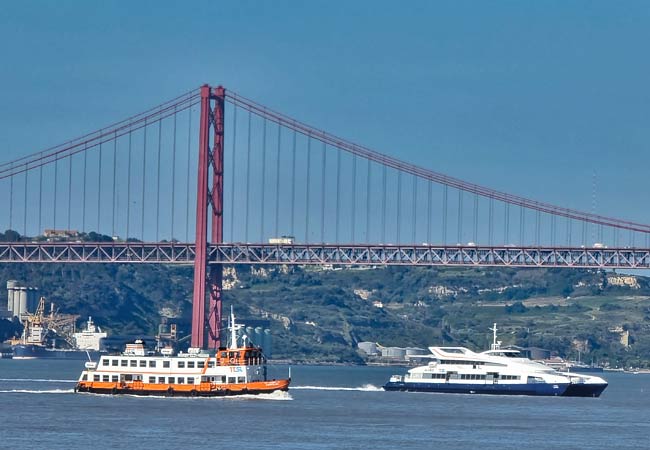
Where to eat in Cacilhas
Cacilhas's restaurant scene developed from its 19th-century role as a leisure destination for Lisboetas who came for donkey rides and seafood lunches. Today, it remains primarily a Portuguese dining destination, with restaurants focused on fresh seafood and traditional cooking.
Local Favourites
Restaurante Farol – A century-old institution steps from the ferry terminal. This classic marisqueira has live seafood tanks ensuring ultimate freshness. Popular with locals for generous seafood platters and their unique beer system with special cooling pipes that keep it perfectly chilled.
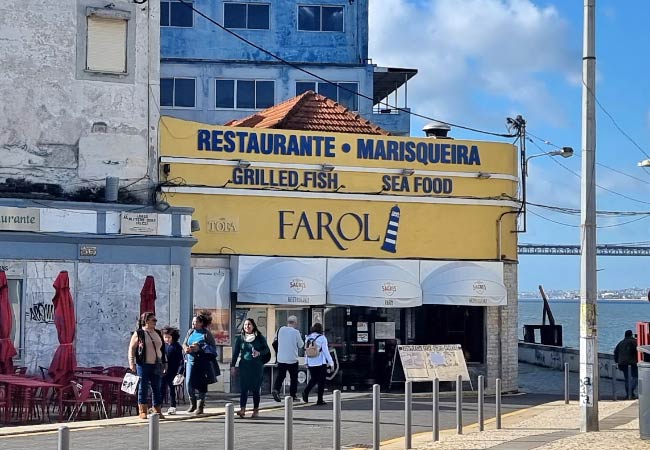
Solar Beirão – Founded in 1968 by a native of Beira, this family-run restaurant expanded from 48 to 120 seats due to its popularity. Features its own seafood nurseries and is known for exceptional freshness. Locals recommend ending your meal with a ginginha (cherry liqueur).
Vale do Rio – What started as a grocery store has evolved into one of Cacilhas's best seafood houses. Famous for its afternoon promotion: a beer with tiny shrimp for just €2.40. The charcoal-grilled fish is exceptional, and there's a TV at the counter for watching football.
Cabrinha – Hidden in a side street off Rua Cândido dos Reis, this former wine warehouse now serves as a "temple for fresh seafood." Typically offers over 20 types of seafood daily. The building's history adds character – wine barrels were once stored here before loading onto cod fishing boats.
Cova Funda – The best-value option is this no-frills tasca where quality trumps ambiance. Particularly pleasant in summer with outdoor seating and the smell of fish grilling on charcoal by the roadside. Trust the daily recommendations.
Boteco 47 – A more contemporary option from chef João Paulo Zortéa (formerly of Atira-te ao Rio). This "unpretentious petiscos" spot has a large terrace on the main street and combines Portuguese traditions with Brazilian influences. Great for a casual meal with creative small plates.
Insider tip: Most locals head to restaurants around 13:00-14:00 for lunch and 20:00-21:00 for dinner. Arriving just before or after these times ensures better service and fresher selections from the kitchen.
The Famous Duo (Book Well Ahead)
Ponto Final – The most sought-after restaurant sits on a narrow pier with tables practically over the water. Featured in "Money Heist," it serves traditional Portuguese dishes with a focus on rice-based seafood stews. The magical sunset views of the city skyline and 25 de Abril Bridge have made this the hardest reservation in Cacilhas.
Atira-te ao Rio – Next to Ponto Final with identical views but a more contemporary menu. Easier to book and equally impressive.
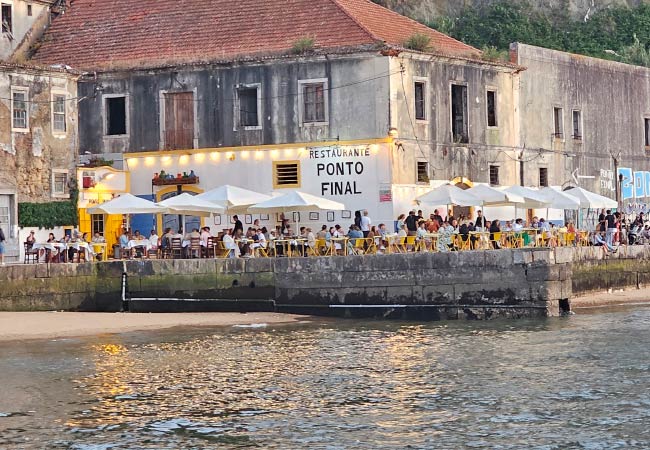
The History of Cacilhas
Cacilhas tells the story of Lisbon from the working waterfront, a narrative of fishermen, shipbuilders, and ferry passengers that stretches back over 5,000 years.
The Romans first recognized the strategic value of this southern shore, establishing fishing operations and salt-preservation facilities to supply their empire. The Moors later built defensive fortifications on the high ground, controlling river traffic from their commanding position. These ancient foundations still shape the district's layout, with the upper town perched on the same strategic cliffs.
By the 19th century, Cacilhas had evolved into Lisbon's playground. While the riverside remained busy with fishing boats and commerce, the inland areas featured noble estates and hunting grounds. Portuguese royalty, including King Carlos I, would ferry across for hunting expeditions and countryside retreats
Between 1870 and 1920, Cacilhas earned fame as the "land of donkeys" (terra dos burros). Wealthy Lisboetas would take Sunday ferry trips specifically for organized donkey rides called burricadas. These excursions, ranging from short circuits around the village to day-long treks toward the Alfeite estate, became a social phenomenon. This quirky tourism boom created Cacilhas's restaurant culture, as riders needed refreshment after their adventures. Many of today's traditional seafood restaurants trace their origins to this donkey-riding era.
The 20th century brought Cacilhas's most dramatic transformation. The Lisnave shipyards, opened in 1967, converted 30 hectares of riverfront into one of Europe's largest shipbuilding facilities. At its peak, Lisnave employed 10,000 workers, creating "a city within the city." Families migrated from rural Portugal, union movements flourished, and the massive gantry cranes became symbols of industrial might. The shipyard's closure in 2000 left not just economic devastation but an identity crisis for a community built around steel and sweat.
Today's Cacilhas exists between its working-class past and an uncertain future. The abandoned Lisnave site attracts urban explorers and artists, including the renowned Vhils, who creates haunting portraits on decaying walls. Plans for waterfront redevelopment promise modernization, yet the massive crane still looms over the river, a 300-ton monument to industrial heritage.
Weekend visitors eating grilled fish where donkey riders once picnicked, ferry passengers following routes used since Roman times, and artists finding inspiration in industrial decay – all participate in Cacilhas's ongoing story of reinvention.
Discover more of Lisbon with our most popular guides
If you've found our content valuable, we'd welcome your support.
The digital publishing landscape has evolved significantly. As a small independent publisher, we face growing challenges. Search engines increasingly favour paid content over organic results, while AI-generated content often reproduces original work without attribution.
To support our work, please consider bookmarking this page (press Ctrl + D) for quick access. If you find an article helpful, we'd be grateful if you'd share it with friends on social media.
For specific questions, please see our Reddit community at r/LisbonPortugalTravel.
Should you notice any outdated or incorrect information, please contact us at [email protected]
Thank you for helping us continue to provide valuable content in an increasingly challenging digital environment.
A complete list of all of our Lisbon articles
If you've found our content valuable, we'd welcome your support.
The digital publishing landscape has evolved significantly. As a small independent publisher, we face growing challenges. Search engines increasingly favour paid content over organic results, while AI-generated content often reproduces original work without attribution.
To support our work, please consider bookmarking this page (press Ctrl + D) for quick access. If you find an article helpful, we'd be grateful if you'd share it with friends on social media.
For specific questions, please see our Reddit community at r/LisbonPortugalTravel.
Should you notice any outdated or incorrect information, please contact us at [email protected]
Thank you for helping us continue to provide valuable content in an increasingly challenging digital environment.



































